Interesting Facts About El Salvador You Never Knew
Did you know El Salvador is a land of volcanoes, with over 100 scattered across the country? You'll find the nation's flag adorned with blue stripes representing two oceans, while its coat of arms features five volcanoes symbolizing different departments. The Torogoz, El Salvador's national bird, boasts vibrant plumage and a unique racket-like tail. If you're a surf enthusiast, you'll be thrilled by the country's 307 kilometers of coastline, offering world-class waves. El Salvador's coffee production is renowned globally, with high-quality Arabica beans contributing to its rich cultural heritage. These facets only scratch the surface of this diverse Central American gem.
This post may contain affiliate links. If you make a purchase through these links, I may earn a commission at no additional cost to you. Additionally, portions of this post may be generated using artificial intelligence (AI) technology. While we strive for accuracy, please be aware that AI-generated content may not always be perfect and should be fact-checked when necessary.
The Spatula Scoops
- El Salvador is home to over 100 volcanoes, with about 20 considered potentially active.
- The national flag features five volcanoes on its coat of arms, representing five departments.
- El Salvador's national bird, the Torogoz, has a unique racket-like tail and vibrant plumage.
- The country boasts 307 kilometers of coastline with world-class surf spots attracting global enthusiasts.
- El Salvador was once the fourth largest coffee producer globally, known for high-quality Arabica beans.
Land of Volcanoes
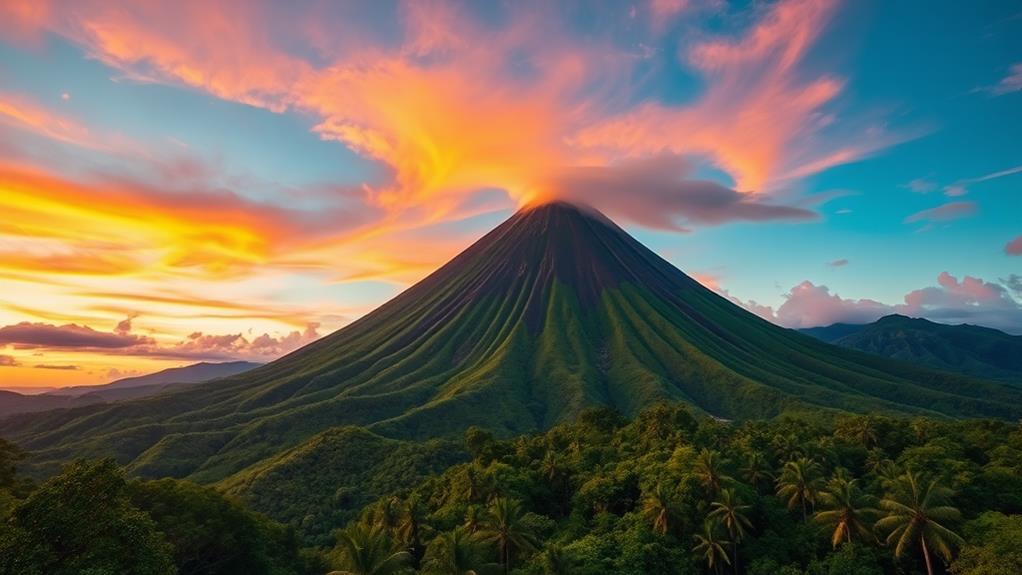
Exploring El Salvador's volcanic landscape reveals why it's aptly named the "Land of Volcanoes." With over 100 volcanoes dotting its terrain, this small Central American country boasts an impressive geological profile. You'll find approximately 20 of these volcanoes classified as potentially active, showcasing the dynamic nature of El Salvador's topography.
As you trek through the country, you'll encounter Santa Ana, also known as Ilamatepec, the highest volcano standing at 2,381 meters above sea level. It's a popular hiking destination for both locals and tourists. If you're interested in recent volcanic activity, Chaparrastique last erupted in December 2013, demonstrating the ongoing geological processes shaping the land.
El Salvador's volcanic landscape isn't just visually stunning; it's also incredibly beneficial for agriculture. The fertile soil resulting from volcanic activity makes the country ideal for coffee production, a significant part of its economy. For a unique volcanic experience, you can visit Sirena Volcano on the island of San Salvador. It's the only volcano in El Salvador that forms an island, rising dramatically from the Pacific Ocean.
Flag Symbolism
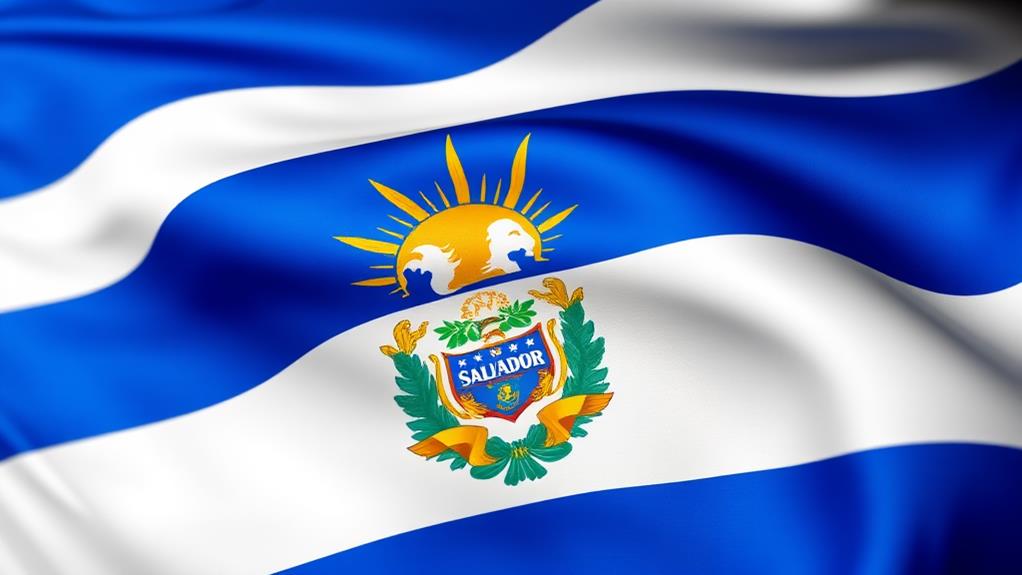
On El Salvador's flag, you'll find a rich tapestry of symbolism representing the nation's values and geography. The flag features a horizontal tricolor design with two blue stripes sandwiching a white one. These colors aren't just for show; they carry deep meaning. The blue stripes symbolize the Pacific and Atlantic Oceans, highlighting El Salvador's coastal location, while the white stripe represents peace.
At the heart of the flag, you'll see the national coat of arms, which is packed with symbolism. It features five volcanoes, representing El Salvador's five departments and showcasing the country's volcanic landscape. Above the volcanoes, you'll spot a triangle containing the eye of providence, symbolizing God's watchful gaze over the nation.
Below the triangle, you'll notice the national motto: "Dios, Unidad, Libertad" (God, Unity, Liberty). This phrase encapsulates El Salvador's core values and national identity. The flag's design serves as a constant reminder of the country's natural resources, commitment to peace, and cultural heritage, making it a powerful symbol of national pride and unity.
The Torogoz National Bird
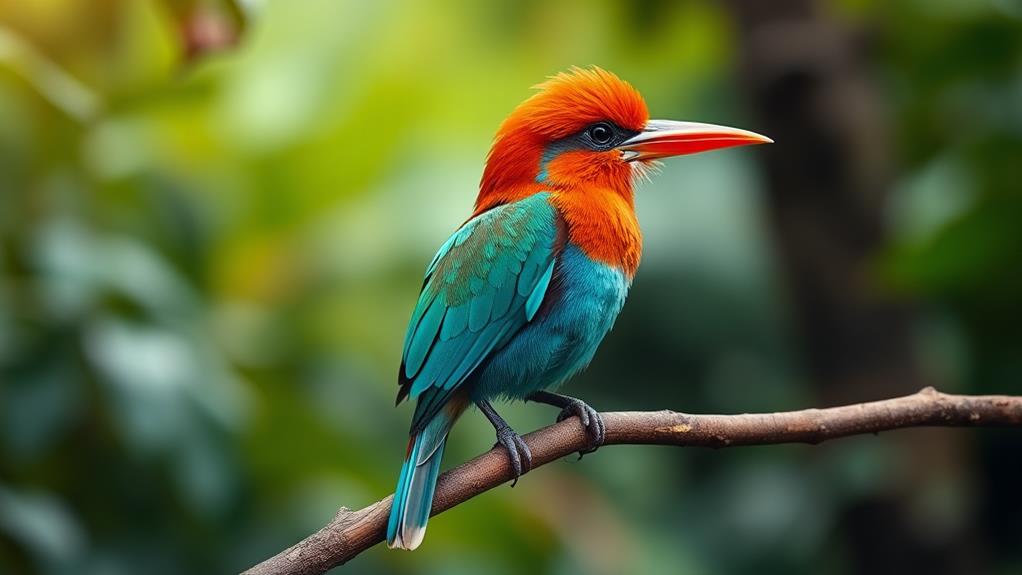
El Salvador's national bird, the Torogoz, stands out as a striking symbol of the country's natural beauty. You'll be captivated by this magnificent creature, also known as the turquoise-browed motmot, which was declared a national symbol in 1999. The Torogoz's vibrant plumage and distinctive racket-like tail make it easily recognizable, even to casual observers.
When you're exploring El Salvador's tropical forests or lush gardens, keep an eye out for this charming bird. You might witness its unique "bobbing" behavior while perched, adding to its endearing personality. The Torogoz's presence in these diverse habitats contributes considerably to the country's rich avian biodiversity.
Surfing Paradise
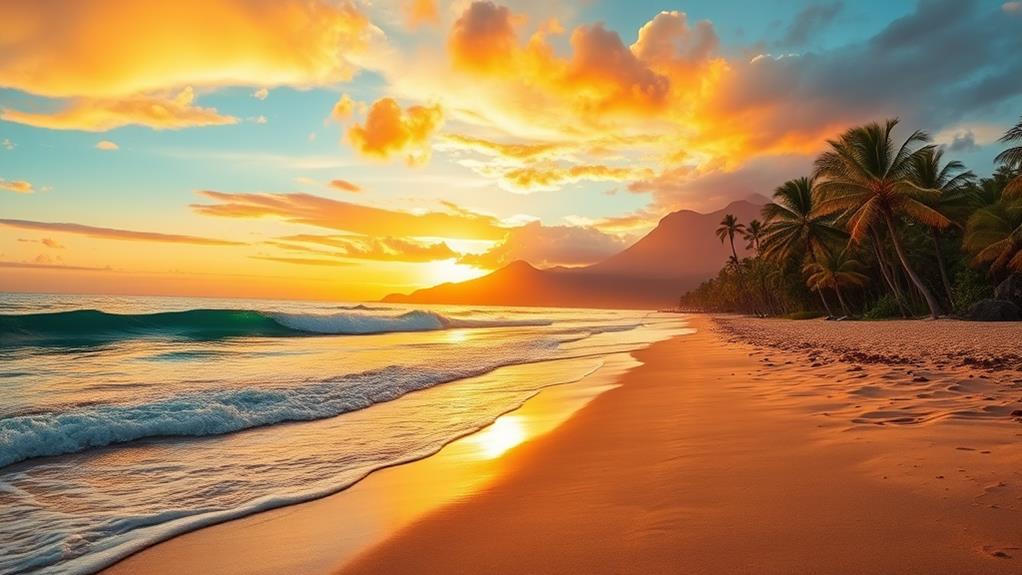
Surfers worldwide flock to El Salvador's Pacific coast, drawn by its reputation as a surfing paradise. With 307 kilometers of stunning coastline, you'll find consistent waves that make it a prime destination for surf enthusiasts. El Salvador's long, powerful swells are particularly impressive at renowned surf spots like Punta Roca and Punta Mango.
If you're planning a surf trip, the best time to visit is during the wet season from May to October. This period offers peak wave sizes and favorable offshore winds, creating ideal conditions for catching that perfect ride. El Salvador's warm water temperatures and breathtaking scenery add to the allure, making your surfing experience even more enjoyable.
The country's commitment to surfing is evident in its hosting of annual surfing competitions, including the prestigious ISA World Surfing Games. These events showcase El Salvador as a competitive surfing hub and attract top talent from around the globe. What's more, you'll find that El Salvador offers an affordable surfing experience compared to other popular destinations, making it an attractive option for budget-conscious wave seekers.
What Makes Chile’s Facts Comparable to El Salvador’s?
Chile and El Salvador, despite their geographical differences, share intriguing parallels in culture, history, and natural beauty. From breathtaking landscapes to vibrant traditions, both nations captivate global attention. Delve deeper and uncover interesting facts you never knew about chile, such as its record-breaking coastline, which draws unique comparisons to El Salvador’s Pacific charm.
World-Famous Coffee Production
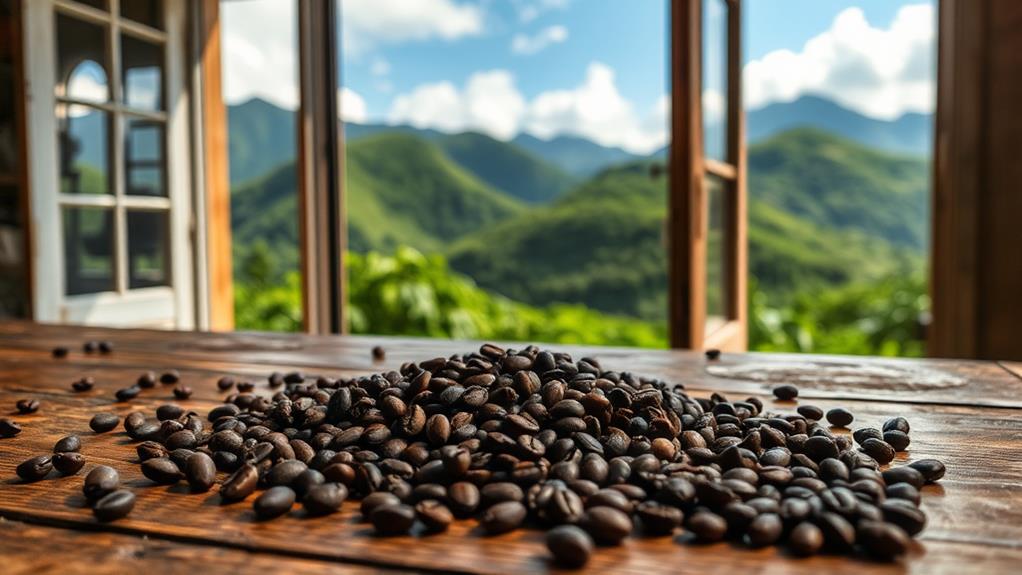
While El Salvador may be known for its surfing, the country's reputation for world-class coffee production is equally impressive. Once the fourth largest coffee producer globally, El Salvador is renowned for its high-quality Arabica beans, particularly varieties like Pacas and Pacamara. The country's coffee cultivation thrives due to its fertile volcanic soil and favorable climate, creating ideal conditions for premium coffee production.
Coffee harvesting in El Salvador typically occurs between November and March. Over time, the industry has evolved to incorporate sustainable practices and certifications, ensuring the longevity of this essential sector. Coffee production isn't just significant for export revenues; it's also integral to the livelihoods of many local farmers.
| Coffee Aspect | Impact | Significance |
|---|---|---|
| Economy | Important export | Revenue source |
| Agriculture | Sustainable practices | Environmental protection |
| Culture | Traditional coffee shops | Local heritage |
You'll find that coffee culture is deeply embedded in El Salvador's identity. Traditional coffee shops serve locally sourced beans, showcasing the country's brewing techniques. When you visit, you'll have the opportunity to experience firsthand why El Salvador's coffee has earned its world-famous status.
Frequently Asked Questions
What Is a Weird Fact About El Salvador?
You might be surprised to learn that El Salvador is the only country in the world to adopt Bitcoin as legal tender. In 2021, this small Central American nation took a bold step into the world of cryptocurrency, making Bitcoin an official currency alongside the US dollar. This move has sparked global interest and debate about the future of digital currencies and their role in national economies. It's a unique experiment in financial innovation on a national scale.
What Are 15 Interesting Facts About El Salvador?
Imagine a land where volcanoes whisper secrets and coffee beans tell tales. That's El Salvador for you. You'll find this tiny Central American gem packed with surprises. Did you know it's called the "Land of Volcanoes" with over 20 active ones? Or that its national bird, the Torogoz, sports striking blue plumage? El Salvador's also a coffee powerhouse, once ranking fourth globally. Uniquely, it uses the U.S. dollar as its official currency. With 500+ bird species, it's a biodiversity hotspot too.
What Are El Salvadorans Known For?
You'll find El Salvadorans known for their rich cultural heritage, blending Indigenous, Spanish, and African influences. They're celebrated for their vibrant festivals, traditional crafts, and delicious cuisine, especially pupusas. As inhabitants of the "Land of Volcanoes," they've adapted to their unique landscape. El Salvadorans are passionate soccer fans, with their national team, La Selecta, reflecting this enthusiasm. They're also recognized for their resilience, having overcome historical challenges to build a diverse and dynamic society.
What Does El Salvador Not Touch?
You might be surprised to learn that El Salvador doesn't touch the Caribbean Sea. Unlike its Central American neighbors, it's the only country in the region without a Caribbean coastline. Instead, you'll find El Salvador bordered by Guatemala to the north and Honduras to the east. Its entire coastline, about 307 kilometers long, faces the Pacific Ocean. This unique geographical position greatly impacts El Salvador's climate, biodiversity, and economic opportunities compared to countries with Caribbean access.





